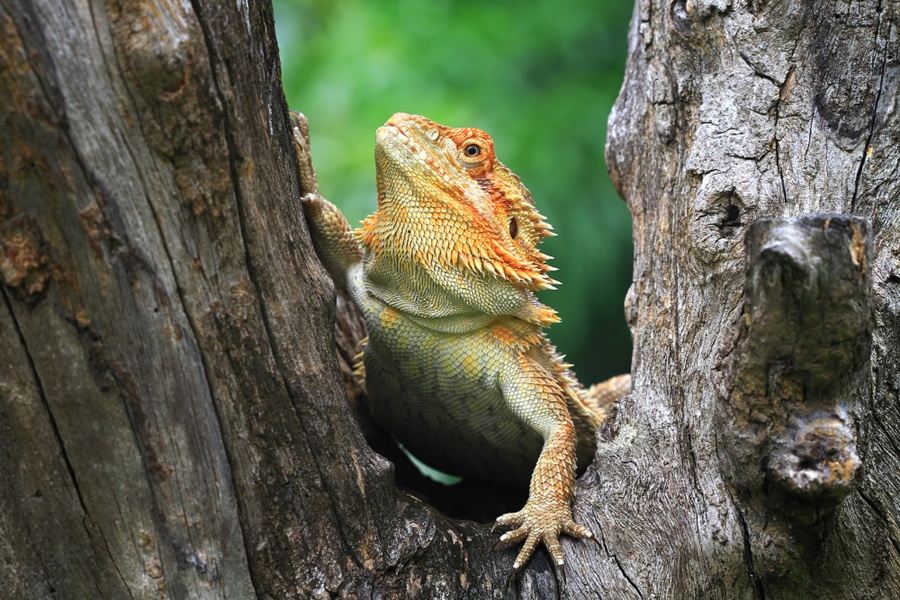If you’re a bearded dragon owner, chances are you’ve asked yourself: how long can my bearded dragon go without food? The short answer is that adult bearded dragons can typically survive without food for anywhere between one to two weeks, sometimes longer under specific conditions like brumation. However, this doesn’t mean it’s healthy or advisable to let them go that long without eating. Understanding the reason behind the lack of appetite is crucial for their well-being.
Understanding Bearded Dragon Feeding Patterns
Bearded dragons are reptiles native to arid regions of Australia. In the wild, food availability can fluctuate, and these lizards have evolved to cope with occasional fasting. However, in captivity, they rely entirely on what we provide. A healthy adult bearded dragon should be eating a balanced mix of live insects (like crickets, roaches, or worms) and vegetables multiple times a week. Younger dragons require daily feeding due to their rapid growth.
How Long Can They Go Without Food?
Here’s a breakdown depending on age and condition:
- Healthy Adults: 10 to 14 days without food, sometimes up to a month during brumation (a hibernation-like state).
- Juveniles: 2 to 4 days, but fasting should be avoided.
- Sick or Underweight Dragons: Should not go more than a few days without eating unless directed by a vet.
Keep in mind, just because they can go that long doesn’t mean they should. A prolonged lack of food can lead to nutritional deficiencies, weight loss, and immune suppression.
What Is Brumation?
Brumation is a natural process similar to hibernation, usually occurring in the colder months. During this period, bearded dragons become less active and may stop eating altogether. It’s not uncommon for a brumating dragon to go several weeks without food, but they usually still drink water.
I remember the first time my dragon, Spike, entered brumation. I was panicked—he hadn’t eaten in days, barely moved, and kept hiding in his cave. After a vet check confirmed brumation, I learned to adjust his environment and let nature take its course. Within weeks, he was back to his usual energetic self.
Possible Reasons a Bearded Dragon Stops Eating
Not all fasting is due to brumation. Here are some other causes:
- Stress: Changes in habitat, handling, or the presence of other pets.
- Illness: Impaction, parasites, respiratory infections.
- Improper Lighting or Temperature: UVB lighting is crucial for digestion and appetite.
- Poor Diet: If your dragon isn’t getting the right mix of food, they might stop eating altogether.
According to VCA Animal Hospitals, bearded dragons require precise care, and their appetite is often the first sign that something is wrong.
What to Do If Your Bearded Dragon Isn’t Eating
Here’s what you can do to help:
- Check the Environment: Make sure the basking temperature is between 95–110°F and that UVB lighting is functional and not expired.
- Hydration: Offer water through misting, soaking, or dripping it on their snout. Dehydration can worsen loss of appetite.
- Stimulate Appetite: Try feeding their favorite live insects, or use a reptile-safe appetite stimulant (after vet consultation).
- Vet Visit: If fasting lasts longer than a week (and it’s not brumation), schedule a veterinary appointment to rule out illness.
How to Monitor Their Health During Fasting
Keep an eye on:
- Weight loss: Use a digital scale weekly.
- Behavior changes: Lethargy, hiding, or erratic movements may signal illness.
- Color and skin tone: Dull, darkened skin might indicate stress or poor health.
A good tip is to keep a journal of their eating habits, temperatures, and activity. It helps spot patterns or issues early on.
Conclusion
While a healthy adult bearded dragon can survive without food for up to two weeks, that doesn’t mean you should ignore a lack of appetite. From brumation to illness, the cause must be identified and addressed. For juveniles and sick dragons, even short fasting periods can be risky. Always monitor your pet closely and consult a reptile vet when in doubt.
If you found this article informative, feel free to check out our other articles as well.

